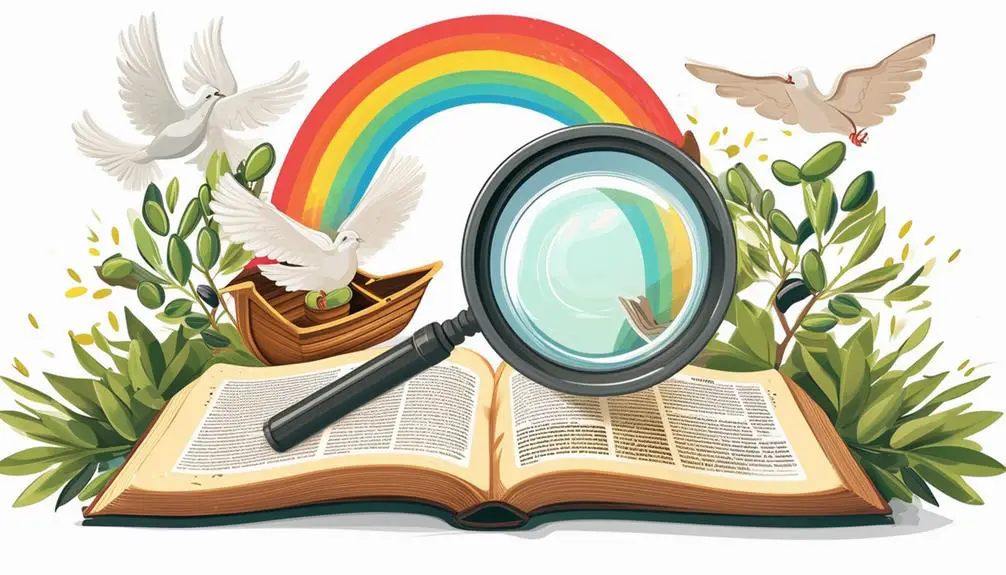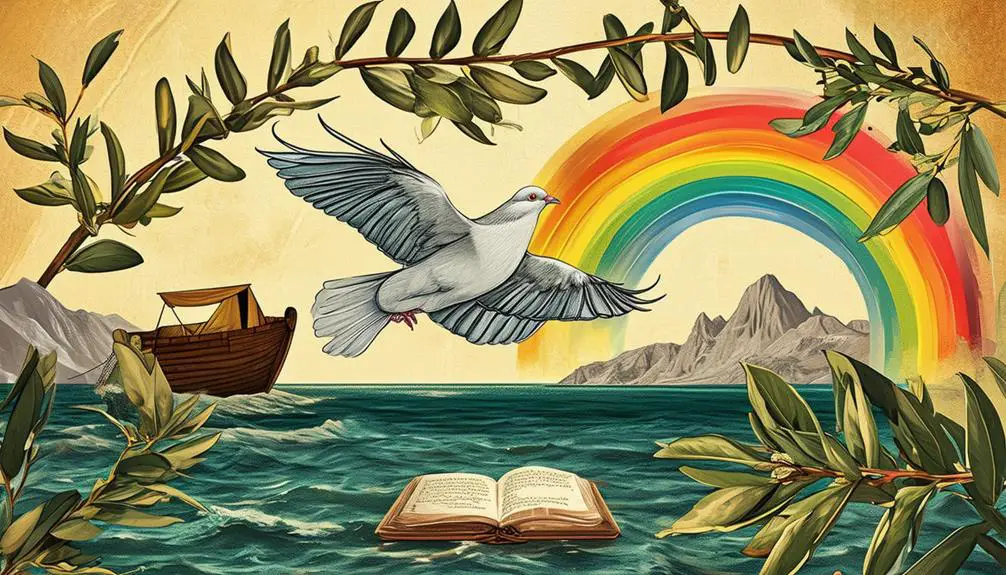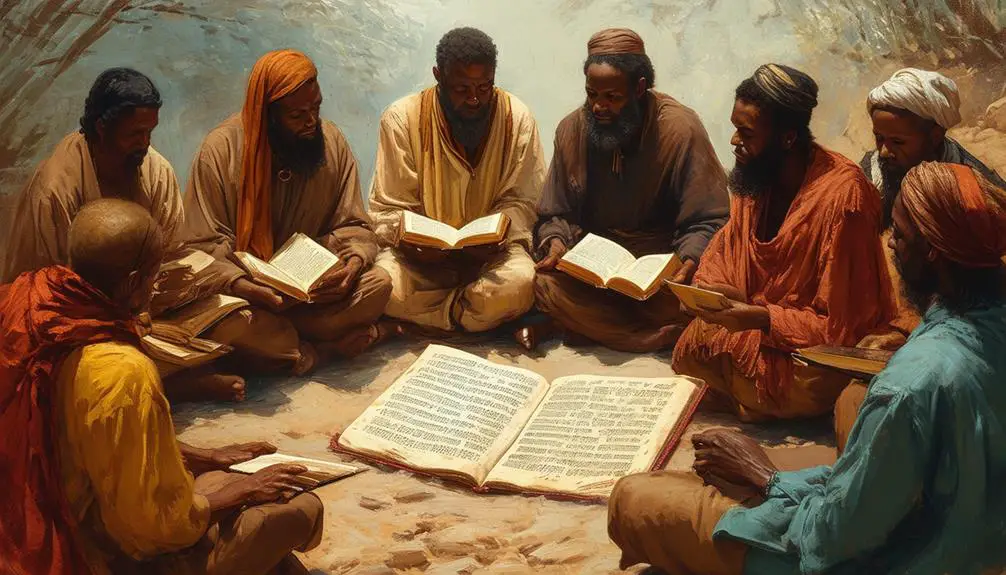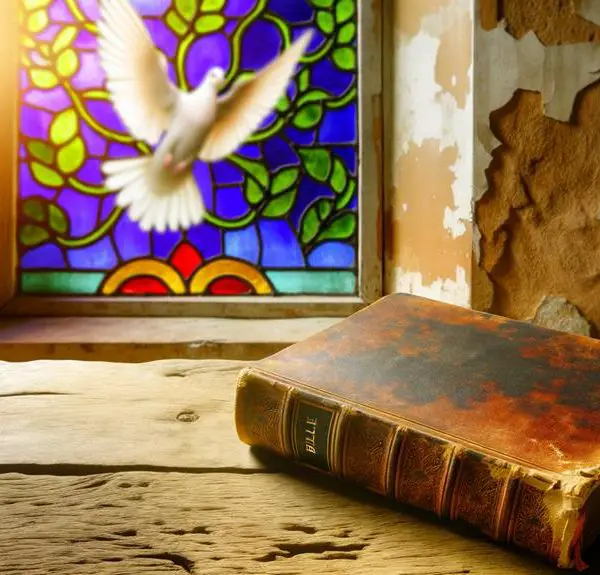Analyze Genesis Chapter 8, uncovering symbolic elements like the dove and olive branch, as we delve into God's promises and human obedience.

Bible Study – The Book of Genesis – Chapter 8 – Summary and Analysis
Genesis Chapter 8 captures the end of the flood and the emergence of a renewed world. You'll witness Noah's obedience, symbolizing hope and new beginnings, as he sends out a raven and a dove to assess the earth's condition. This chapter underscores themes of divine promises, human obedience, and God's authority over creation. You'll explore interpretations focusing on symbolic elements, such as the dove and the olive branch. Diving deeper into these themes and narratives will surely enrich your understanding of this significant biblical event.
Key Takeaways
- Genesis Chapter 8 details the aftermath of the Great Flood and Noah's time in the Ark.
- Noah's obedience to God and his faith during the flood underscores the theme of human obedience.
- The narrative symbolizes renewal and restoration post the flood, emphasizing God's mercy and promises.
- Key characters like Noah and the dove offer insights into themes like faithfulness, peace, and hope.
- The chapter invites personal reflections on faith, patience, perseverance, and gratitude.
Overview of Genesis Chapter 8

What if we were to explore deeply into Genesis Chapter 8, uncovering its narratives and drawing out its profound theological implications? You'd find that this chapter marks a significant turn in the Noah's Ark narrative, focusing largely on the 'Ark Construction' and 'Flood Duration'.
You'd be intrigued to learn that Genesis Chapter 8 reveals the intricacies of the Ark's construction, underscoring the precision and obedience of Noah in following divine instructions. The Ark's construction wasn't merely a physical undertaking; it was a manifestation of faith, obedience and resilience.
Equally notable is the 'Flood Duration'. Genesis 8 gives a detailed account of the flood's duration, revealing that the waters prevailed for 150 days. However, you'd find that the flood wasn't just an arbitrary divine punishment, but a purifying act, symbolically washing away the corruption that had marred creation.
In essence, Genesis Chapter 8 is rich in theological and moral implications, reflecting on God's justice, mercy, and promise of restoration. As a reader, you're invited to delve deeper into these narratives, appreciating the profound truths they unravel about human nature, divine intervention, and the power of faith.
Detailed Chapter Summary
Diving into the details of Genesis Chapter 8, you'll discover that it unfolds in three distinct phases: the cessation of the rain, the receding of the floodwaters, and the earth's restoration after the flood. The narrative starts with the Flood Aftermath, signifying the end of God's divine judgement. The rain stops, the fountains of the deep and the windows of heaven are closed, indicating a significant shift in the narrative.
Next, the receding of the floodwaters takes centre stage. The Ark's Significance is emphasized here, as it effectively serves as the sole sanctuary preserving all life. The ark rests on the mountains of Ararat, and as the waters decrease, Noah sends out a raven and then a dove to ascertain the earth's condition.
Key Characters Analysis

In our analysis of the key characters, you'll find that Noah's role as the obedient servant of God is central to this chapter's narrative. His character motivation is driven by his steadfast faith in God and his duty to fulfill God's commands, even amidst cataclysmic events.
Noah's obedience is an essential element of biblical symbolism, representing unwavering faithfulness in times of crisis. His actions, such as releasing the dove to find dry land, symbolize hope and new beginnings. His patient waiting for God's signal to exit the ark showcases his submission to divine authority.
God, another key character, is portrayed as a compassionate and patient deity. His covenant with Noah highlights His divine mercy and love for humanity. God's motivation to promise not to destroy the earth again with a flood underscores His infinite benevolence.
Lastly, the dove, while not a human character, holds significant symbolic weight. It represents peace, hope, and the Holy Spirit in biblical symbolism. Its return with the olive branch confirms God's promise of life after judgment.
Significant Themes Explored
Exploring the significant themes in Genesis Chapter 8, you'll notice they're deeply intertwined with the narrative's structure and characters, shedding light on profound theological insights. The themes provide a rich tapestry of divine interaction and human response, revealing a detailed picture of divine promises and human obedience.
- Divine Promises: God's promises are a prominent theme. You'll observe God's commitment to humanity in His covenant with Noah, where He promises never to destroy the earth again by a flood. This theme underscores God's faithfulness despite human fallibility.
- Human Obedience: Noah's obedience to God's commands, even amidst catastrophic circumstances, is a significant theme. His unwavering faith and obedience serve as a model for future generations.
- God's Sovereignty: The narrative underscores God's supreme control over creation. He controls the flood and the restoration of the earth, emphasizing His ultimate authority.
- Renewal and Restoration: The chapter concludes with the earth's renewal, symbolizing a fresh start for humanity. It's a theme of hope and new beginnings, grounded in God's mercy and grace.
Interpretations and Perspectives

When you explore the various interpretations and perspectives of Genesis Chapter 8, it's clear that the text is open to a multitude of readings, each shedding unique light on the narrative's theological and moral implications.
Symbolic interpretations of the chapter often highlight the significance of the dove and the olive branch as symbols of peace, renewal, and the divine promise. The dove's return with the olive leaf, for instance, is seen as a sign of God's reconciliation with humanity and the earth after the destructive flood.
Cultural perspectives provide another layer of understanding. Many cultures regard the flood narrative as a purifying act, a necessary reset to eradicate the world's corruption. In this view, Noah's ark stands as a symbol of preservation, a demonstration of God's mercy and his covenant with humanity.
Furthermore, the number 'seven' reoccurs throughout the chapter, a number revered in many cultures for its spiritual and divine associations. This cultural symbolism further underscores the sacredness of the narrative.
In your study of Genesis Chapter 8, it's crucial to explore these interpretations and cultural perspectives. They offer profound insights into the text's theological depth and its enduring relevance across different cultures and generations.
Personal Reflections and Takeaways
After exploring these interpretations and cultural perspectives, it's important for you to also reflect on personal takeaways from Genesis Chapter 8. This process sparks both spiritual growth and personal transformation, as you delve deeper into the text's profound messages.
To facilitate this reflective process, consider the following points:
- Faith in Divine Providence: Genesis 8 reiterates the importance of faith. Noah's unwavering belief in God, even amidst catastrophic circumstances, highlights how faith can guide us through life's most tumultuous periods.
- Patience and Perseverance: The long wait on the ark before the land became habitable again underscores the virtue of patience and the value of perseverance.
- The Power of Renewal: The imagery of the earth being cleansed and renewed post-flood symbolizes personal transformation. It's a reminder that it's always possible to start anew, regardless of past mistakes or circumstances.
- Gratitude: Noah's first act after leaving the ark was to build an altar and offer sacrifices to God. This symbolizes gratitude, a key element in spiritual growth.
Reflecting on these key takeaways could enhance your understanding of Genesis 8 and its application to your life.
Frequently Asked Questions
What Cultural Context Influenced the Events in Genesis Chapter 8?
You're exploring the cultural influences on Genesis chapter 8. It's fascinating to know that 270+ cultures have flood narratives. This chapter is deeply rooted in Ancient Cosmology, reflecting a shared understanding of universal destruction and renewal. The flood event, Noah's Ark, and God's covenant are part of a broader Near Eastern tradition, demonstrating the interplay between divine power and human responsibility. This cultural context greatly shaped the events in this chapter.
Are There Any Contradictions Between Genesis Chapter 8 and Other Biblical Texts?
You might find inconsistencies between Genesis Chapter 8 and other biblical texts, especially regarding the Flood interpretation and the Ark's dimensions. Some scholars argue these discrepancies can be attributed to different authors' perspectives. It's important to remember that the Bible isn't a single book, but a collection of texts written over centuries. Hence, contradictions may emerge, depending on the interpretation you're following.
How Have Scholars Debated the Symbolism in Genesis Chapter 8 Over Time?
You've likely noticed that scholars often debate the symbolism in Genesis chapter 8. Some focus on flood symbolism, seeing it as a cleansing or rebirth. Others highlight Noah's faith as a symbol of obedience and trust in God. Their interpretations have evolved over time, sparking lively discussions and varying perspectives. It's a complex issue, and you'll find no shortage of nuanced, scholarly analysis on the subject.
What Impact Has Genesis Chapter 8 Had on Modern Religious Practices or Belief Systems?
Genesis 8's impact on modern religious practices is profound. You'll find that Noah's faith, exemplified in his patience and obedience, is often used in sermons to inspire similar virtues. The dove symbolism, representing peace and God's promise, has been incorporated into numerous rituals and iconography. It influences how believers perceive their relationship with God, underscoring the importance of trust, patience, and the hope for divine assurance in their spiritual journeys.
Can Genesis Chapter 8 Be Connected to Any Secular or Historical Events?
You might think Genesis 8's just a spiritual tale, but there's a twist! Flood mythologies aren't exclusive to the Bible, they're found worldwide. Historians, they love this stuff, because it suggests a historical event might've sparked these tales. So, yes, Genesis 8 could relate to actual historical events. But remember, historical verification's tricky business. The evidence isn't always clear-cut, and interpretations can vary. So, it's a possible connection, but not a confirmed fact.



Sign up